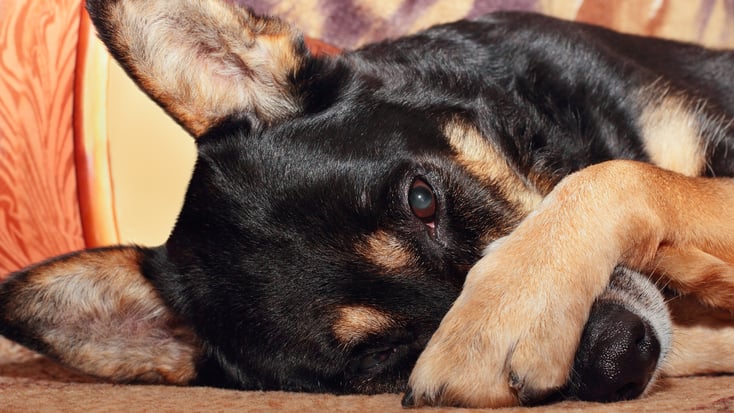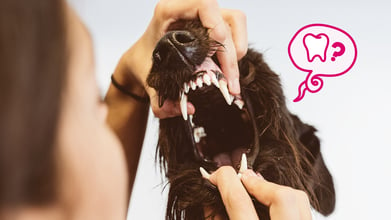Why Does My Dog's Breath Smell So Bad?

Bad breath is a common issue in dogs that can stem from various factors. Recognizing the causes and taking appropriate action to ensure your furry friend has fresh breath and optimal oral health is important.
In this article, we'll explore the common reasons behind bad breath in dogs and provide practical solutions to address the problem. Let's dive in!
Key Takeaways:
- Dental issues, poor eating habits, and underlying systemic diseases can cause bad breath in dogs.
- Bad breath can be a warning sign of underlying health issues like kidney dysfunction, diabetes, or liver disease.
- Maintain good oral health in dogs by scheduling regular check-ups, brushing with dog-specific toothbrushes and toothpaste, and incorporating dental diets.
Causes of Bad Breath in Dogs
One of the primary culprits of bad breath in dogs is dental issues. Tartar buildup, tooth decay, and periodontal disease can lead to gum inflammation (gingivitis), cavities, infections, and a not-so-pleasant odor. Neglecting your dog's oral hygiene allows plaque and bacteria to accumulate, contributing to bad breath.
In addition to dental problems, poor eating habits can play a role in bad breath. Dogs who rummage through garbage or consume feces may experience lingering odors. Furthermore, certain dietary choices, such as raw or home-cooked diets, can disrupt the natural balance of bacteria in the mouth and gut, resulting in an unpleasant breath.
It's worth noting that bad breath can also indicate underlying systemic diseases. If your dog's breath has an ammonia or urine smell, it might be a sign of severe kidney dysfunction. A sweet or fruity smell could be an indication of canine diabetes.
Additionally, if the foul breath is accompanied by symptoms like vomiting, lack of appetite, or yellowing of the gums, it could suggest liver disease.
Prevention of Bad Breath in Dogs
To maintain good oral health in dogs, follow these preventive measures:
- Regular dental check-ups: Schedule routine dental visits with a veterinarian to detect and address any dental issues early on.
- Establish a brushing routine: Brush your dog's teeth using pet-friendly toothpaste to remove plaque and prevent tartar buildup.
- Dental diets: Consider incorporating specially formulated dental diets designed for dogs, featuring larger kibble size and a textured surface that helps scrape away plaque as your dog chews.
How to Get Rid of a Dog's Bad Breath
To combat bad breath in dogs and promote fresh breath, consider the following steps:
Brush their teeth regularly
Like humans, dogs benefit from regular teeth brushing to maintain fresh breath. Use a dog-specific toothbrush and toothpaste to gently brush their teeth, focusing on the gum line and back molars.
Consider professional dental cleanings
Schedule professional dental cleanings with your veterinarian to remove stubborn plaque and tartar buildup. These cleanings help prevent dental issues and contribute to better breath.
Use dental hygiene products
Explore dental hygiene products designed for dogs, such as dental chews or water additives. These products can help reduce bacteria and freshen your dog's breath while promoting good oral health.
Encourage appropriate chewing
Provide your dog with chew toys or dental treats designed to promote oral hygiene. Chewing on these items helps remove debris and stimulates saliva production, which can naturally combat bad breath.
Consult with a veterinarian
Regular veterinary checkups, including oral health, are essential for your dog's overall health. Your veterinarian can assess your dog's breath, identify any underlying issues, and provide personalized recommendations for maintaining fresh breath.
Home Remedies for Bad Breath in Dogs
While not substitutes for regular dental care, some home remedies can temporarily relieve bad breath in dogs. Incorporating dental chews, breath-freshening treats, or adding a small amount of apple cider vinegar to the water bowl can help freshen their breath. However, consult your veterinarian for personalized recommendations and to ensure proper oral hygiene maintenance.
When to Seek Veterinary Care
Knowing when to seek veterinary care for your dog's bad breath is crucial for their overall health. Keep an eye out for the following indications that it may be time to talk to a veterinarian about your dog's bad breath:
Persistent bad breath
If your dog's breath continues to stink despite your efforts to address it with home care remedies, it's a good idea to consult a veterinarian. Chronic bad breath can be a sign of dental disease or an underlying health condition.
Changes in breath odor
If your dog's breath suddenly becomes significantly worse or develops an unusual smell, it could be a cause for concern. Certain odors, such as ammonia, urine, or a sweet/fruity smell, may indicate kidney dysfunction or diabetes, respectively.
Difficulty eating or swallowing
If you notice your dog having difficulty eating, swallowing, or showing signs of pain while chewing, it may suggest dental problems or oral infections. A veterinarian can perform a thorough examination to identify the cause and provide appropriate treatment.
Bleeding or inflamed gums
If your dog's gums appear red, swollen or bleed easily, it could be a sign of gum disease or other oral infections. Prompt veterinary care can help prevent further complications and discomfort.
Other symptoms
Suppose your dog's bad breath is accompanied by additional symptoms like vomiting, diarrhea, lack of appetite, weight loss, excessive drooling, or changes in behavior. In that case, it's important to seek veterinary care promptly.
Final Thoughts
Bad breath in dogs should never be ignored. By recognizing the signs, seeking veterinary care, and implementing preventive measures, you can improve our dogs' breath and prevent potential health issues. Remember, a little effort in maintaining their oral health goes a long way in ensuring your beloved companions stay fresh and healthy.
Frequently Asked Questions
What makes a dog’s breath stink?
Various factors, such as dental issues, poor oral hygiene, diet, and underlying health conditions, can cause a dog's bad breath. If you notice persistent bad breath in your dog, it's essential to consult a veterinarian for a thorough examination.
Is bad breath in dogs a sign of illness?
Yes, bad breath in dogs can be a sign of illness. It's recommended to consult a veterinarian if your dog's breath consistently has a foul odor.
What to use for a dog’s bad breath?
You can use various methods to address a dog's bad breath, such as regular teeth brushing with pet-friendly toothpaste, dental chews, and breath-freshening products designed for dogs.
Can dogs eat mints for bad breath?
It is generally not recommended to give dogs mints or breath fresheners meant for humans. Some ingredients in mints can be toxic to dogs. It's best to consult with a veterinarian for safe and appropriate solutions to address your dog's bad breath.







